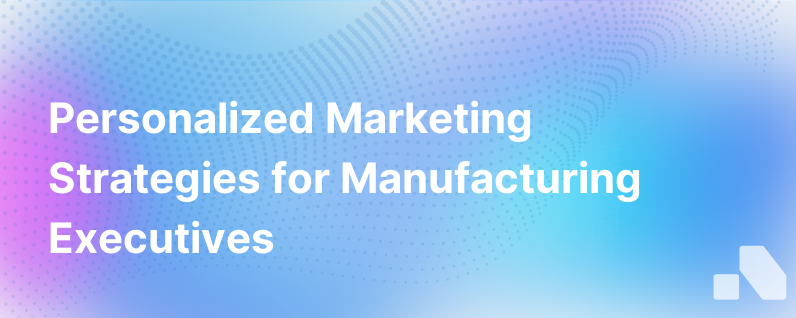
Manufacturers today face a unique set of challenges when it comes to marketing their products. The traditional mass-marketing techniques that involve generic campaigning for wide audiences are no longer as effective in a world where business buyers expect personalized experiences, mirroring the custom-tailored approaches they see in B2C interactions. Personalized marketing has emerged as a necessary strategy for manufacturers looking to stand out in a crowded market and build lasting relationships with their customers.
In this in-depth discussion, we'll explore personalized marketing for manufacturers, why it's essential, and provide actionable strategies to implement it successfully. From leveraging data analytics to adopting the latest in AI and automation tools, manufacturers must be ready to adapt and thrive.
The Imperative of Personalized Marketing for Manufacturers
Personalized marketing is about moving beyond the 'one size fits all' mantra and crafting unique messages and experiences for different segments of your audience. This approach reflects an intimate understanding of your customers' needs, preferences, and pain points, leading to more effective and meaningful marketing efforts.
Why is personalized marketing so crucial for manufacturers?
- It Aligns with Customer Expectations: In an age where personalization is the norm, B2B buyers are not immune to the allure of tailored experiences. They, too, seek partners who understand their unique business needs.
- It Differentiates Your Brand: Personalization can set your manufacturing company apart, assuring your customers that they're not just another account number.
- It Drives Loyalty and Retention: Customization fosters a deeper connection with your customers, which can translate into long-term loyalty and a higher lifetime value.
- It Increases the Efficiency of Marketing Spend: Personalized marketing means fewer wasted resources on prospects that are likely never to convert, and more focus on nurturing the most promising leads.
Key Strategies for Personalized Marketing in Manufacturing
-
Understand Your Customer Base: The cornerstone of personalization is deep customer understanding. Use market research, surveys, and data analytics to create detailed buyer personas for each segment of your target market. These personas should cover job titles, industrial needs, business pain points, and preferred communication channels.
-
Leverage Data Analytics: Invest in CRM and marketing automation platforms that collect and analyze customer data, providing insights that drive personalized interactions. Technologies capable of big data analytics can process large volumes of information to reveal patterns and preferences individual to each customer.
-
Tailor Content to Buyer Stages: Map your customer's journey and develop varied content that caters to each stage. For instance, early-stage prospects might appreciate educational content about your manufacturing processes, while decision-makers will be more influenced by case studies and ROI calculators that showcase tangible value.
-
Use Account-Based Marketing (ABM) Tactics: ABM is a B2B strategy that concentrates sales and marketing resources on a clearly defined set of target accounts within a market and employs personalized campaigns designed to resonate with each account. For manufacturers, ABM ensures that you're engaging with the most valuable prospects in a bespoke manner that increases the likelihood of a sale.
-
Adopt Marketing Automation: Automation tools can help scale personalization efforts. They allow for the dynamic insertion of a lead’s name, company, or industry into email campaigns, the serving of personalized web content based on a visitor's browsing history, or the sending of targeted follow-up messages after an in-person event like a trade show.
-
Take Advantage of Digital and Social Media Platforms: Digital presence allows manufacturers to engage with potential customers where they spend a significant amount of their time. Utilize platforms like LinkedIn for B2B outreach, and create content that speaks directly to the concerns and interests of your customer segments.
-
Invest in Customer Feedback: Regularly solicit feedback through surveys, direct interviews, and social listening. This feedback not only informs product development but also ensures that your marketing messages stay aligned with customer needs.
-
Collaborate with Sales: Ensure that your sales team is equipped with insights from your personalized marketing efforts. The information collected during your marketing campaigns can be invaluable during the sales process.
-
Conduct Ongoing Training: Technology and customer preferences evolve rapidly. An ongoing training program for your marketing team can help keep their skills sharp and knowledge current. Provide resources for them to stay on top of personalization trends and tactics.
Real-World Examples of Personalized Marketing by Manufacturers
Successful manufacturers often deploy personalization in various aspects of their marketing:
- Personalized Email Campaigns: These can increase engagement rates significantly, as they speak directly to the recipient's interests and needs.
- Custom Online Portals: Allowing customers to log in to personalized dashboards where they can track orders, access specific content, and receive tailored product recommendations.
- Product Customization Tools: Enabling customers to visualize and tailor products to their specifications online can drastically enhance user experience and customer satisfaction.
In Conclusion
Manufacturers who embrace personalized marketing strategies put themselves in a powerful position. As the market becomes increasingly competitive, it is the companies that can demonstrate an intimate understanding of their customers' unique needs and preferences that will thrive.
The world of manufacturing marketing is evolving — those who can pivot to more sophisticated, personalized strategies with tools like Aomni will stand out and build stronger, more resilient relationships with customers. With the power of personalization, manufacturers are set to not only meet but exceed the new standards of customer engagement and satisfaction.